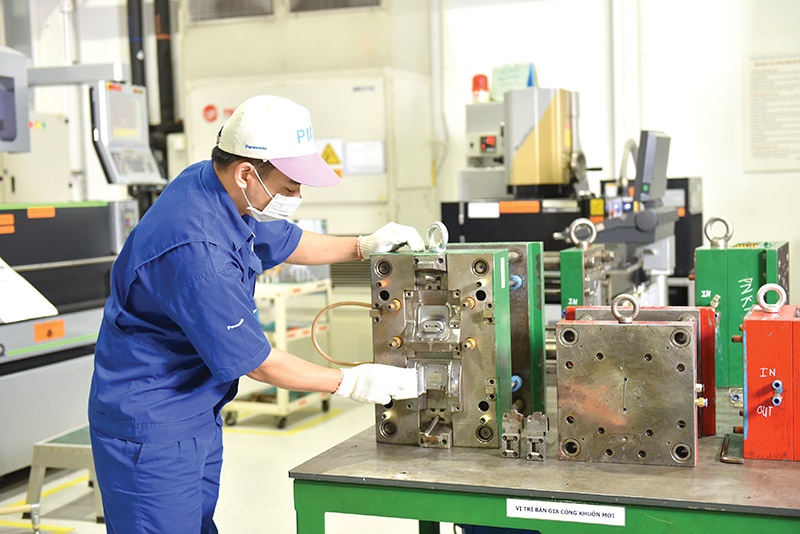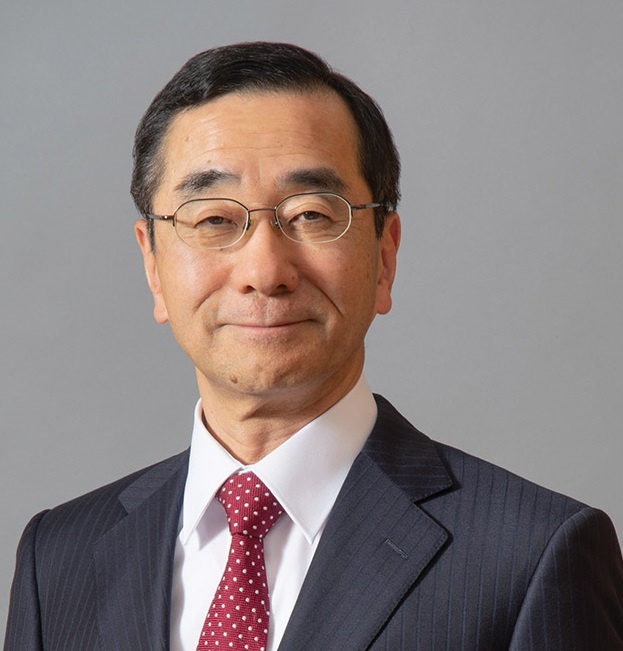PM visit underscores Japanese promise
 |
| Japanese groups want to further expand here in manufacturing, renewables, infrastructure, and more, Photo: Panasonic Vietnam |
On April 30-May 1, Japanese Prime Minister Kishida Fumio paid an official visit to Vietnam, further consolidating a new chapter in both countries’ relations. This was his first visit to Vietnam since he became prime minister in October 2021, and in November 2021 he also welcomed Vietnamese counterpart Pham Minh Chinh, who was paying an official visit to Japan.
During his meetings with Vietnam’s top leaders, both countries discussed new solutions to beef up their ties in economic development, including trade and investment, infrastructure development, and human resources. Both sides also highlighted the imperative need for further policy reforms in favour of foreign investors, including Japanese ones, who are performing well in many sectors in Vietnam.
The Japanese PM is no stranger to Vietnam. During several years in diplomatic roles, Fumio worked as general secretary of the Japan–Vietnam Parliamentary Friendship Union, visited Vietnam in 2014 and 2016 as minister of foreign affairs, and again in 2018 when he was chairman of Japan’s Policy Research Council.
Vietnam’s Ministry of Foreign Affairs said that Fumio also made contributions to lifting the two nations’ bilateral ties to an extensive strategic partnership for peace and prosperity in Asia in 2014, which has been helping Vietnam attract more Japanese investments and expand trade with Japan.
Tsutomu Sugimori, chairman of ENEOS Corporation, said it is interested in energy development in Vietnam and wants to participate in the process of reducing carbon emissions in the country. “We will continue investment activities in many fields, especially the development of renewable energy in Vietnam,” he said.
Producing 50 per cent of Japan’s oil output with the total annual revenue of about $70 billion, ENEOS has been operating in Vietnam since 1990. In 2016, it became a strategic shareholder of Vietnam National Petroleum Group and is expanding its supply chain and store network.
In another case, retailer AEON Group’s president and CEO Motoya Okada said the group’s total revenue in 2020 reached $75 billion. In Vietnam, it has invested $1.18 billion since 2014. AEON will double the number of its trade centres in the nation, and also will list itself on the Vietnamese stock market and export Vietnamese goods like aquatic products and garments to Japan. AEON is also interested in digital transformation projects in Vietnam.
Meanwhile, Masumi Kakinoki, president of Marubeni, said the group wants to implement power projects and infrastructure development in the northeastern province of Quang Ninh. In the near future, Marubeni will build some plants to process both paper and coffee in Vietnam.
And Masayoshi Fujimoto, Sojitz president and CEO, said it is running 17 joint ventures in Vietnam with the total revenue of around $1 billion, operating in the sectors of equipment production, energy, chemicals, electricity, fertiliser, and forestry. Sojitz wants to carry out carbon-reduction projects in Vietnam.
According to the Vietnamese Ministry of Planning and Investment, funding from Japan into Vietnam has kept increasing strongly over the past two years. By late December 2020, Japan had over 4,600 valid investment projects in Vietnam, registered at $60.25 billion. However, one year later, the number rose to almost 4,800 registered at $64.4 billion. Accumulatively as of April 20, the number of projects was 4,835 with the total registered capital of $64.55 billion, making Japan the third-largest foreign investor in Vietnam after South Korea ($78.66 billion) and Singapore ($68.42 billion).
A number of projects that have registered capital worth billions of US dollars include the $1.33 billion O Mon II Thermal Power Plant in the Mekong Delta city of Can Tho, and the $611.4 million Kraft Vina Paper Factory in the northern province of Vinh Phuc.
In early 2021, a joint venture between Vietnam Trading Engineering Construction JSC and Japan’s Marubeni Corporation received a registration certificate for the 1,050MW O Mon II venture. This project is located in the O Mon Power complex, which is a 660MW fuel-burning power station in Can Tho.
Meanwhile, Kraft Vina Paper Factory, funded by Japanese investor Rengo and Thailand’s SCG Packaging, with capacity of 800,000 tonnes per year, aims to produce kraft, lined, and packaging paper. This project was licensed in May 2021.
According to the Japan International Cooperation Agency (JICA), Japan is also the largest provider of official development assistance (ODA) for Vietnam, with about ¥3 trillion ($23 billion) for the period of 1992-March 2021. Since 1993, total loans committed by Japan for Vietnam in the transport sector is about ¥1,174,622 million (nearly $9 billion). “About 70 per cent of Vietnam’s national roads are built and upgraded by ODA of Japan. Completed projects have helped boost connectivity within ASEAN, facilitate the flow of goods supply chains, and support travel. This has also helped localities attract more foreign investment,” JICA said in a report.
According to the Vietnamese General Statistics Office, both countries’ bilateral trade turnover reached $42.7 billion last year, with $20 billion worth of Vietnam’s exports, up 4.4 per cent on-year. In the first four months of this year, Vietnam saw a trade deficit of $790 million, up 57.7 per cent on-year, from Japan.
| Nobuhiko Sasaki - Chairman, Japan External Trade Organization
The relations between Vietnam and Japan have made significant progress over the past many years. Members of the Japanese Chambers of Commerce rose to around 2,000 in Vietnam last year, overtaking Thailand in 2018 and becoming the largest Japanese chamber in Southeast Asia. In recent years, not only as production and processing base, investment in non-manufacturing has increased with the growth of the domestic consumer market. Due to the COVID-19 pandemic, many Japanese companies suspended factories and reduced production. Under severe circumstances, I would like to express my sincere gratitude to Vietnamese Prime Minister Pham Minh Chinh for listening actively to the voices of the industry through several dialogues. At the COP26 climate summit held in the United Kingdom last November, PM Chinh aimed to achieve net-zero greenhouse gas emissions by 2050. Japan has also experienced pollution problems in the post-war high economic growth. Environmental issues have become apparent behind economic development in Vietnam. The Vietnamese government cites environmentally-friendly and advanced technology as one of the priorities in attracting foreign direct investment. It is actively working to balance economic development and environmental conservation. There is much room for Japanese competitive companies to collaborate with Vietnamese companies. |
| Vietnam-Japan cooperation for economic revitalisation Prime ministers Pham Minh Chinh and Kishida Fumio consented to further facilitate business collaborations between Japanese and Vietnamese companies as well as to improve the investment environment for companies through cooperation in such areas as digital transformation, diversification of the production base and development of supporting industries towards resilient global supply chains, including of both countries, which are keys for post-pandemic economic revitalisation. Both sides will continue cooperating in industrial development and will consider expanding the scope of cooperation in training and consultation on business matching and capacity building for Vietnamese manufacturers to enable them to join Japanese companies’ supply chain in Vietnam, in the region and worldwide. The two leaders also shared their perceptions of digital transformation and the development of the digital economy as digital societies will play an important role in the post-pandemic era. They consented to strengthen cooperation in creative innovation, ICT, digital transformation, digital economy, the realisation of smart cities through project formation studies, the development of broadband infrastructure including 5G, and information security. In this context, they recognised that technological ecosystems built upon trust, integrity, and resilience will foster innovation and make the lives of citizens more secure, prosperous, and rewarding, in addition to addressing some of the world’s greatest shared challenges, such as equitable growth, climate change, energy security, and pandemic diseases. The two prime ministers highly value the active role and contribution of Japan’s official development assistance (ODA), and shared the intention to continuously implement development cooperation between the two countries in an effective and smooth manner to ensure their interests and meet the needs of Vietnam. The two prime ministers consented to work together to increase direct investment from Japan to Vietnam. Prime Minister Chinh welcomed Japanese companies in choosing Vietnam as an investment destination and reaffirmed Vietnam’s commitment to creating an open and transparent investment environment and a favourable environment for companies to conduct business. The two prime ministers consented to continue to work closely together to resolve difficulties in implementing Japan’s ODA projects in Vietnam and to promote regional connectivity as well as priority infrastructure projects such as Vietnam’s railroads, airports, ports and highways, which contribute to the development of industrial infrastructure. The two prime ministers consented to actively promote economic recovery ODA programmes which address the emerging needs and interests of the two countries and match the great potential of their extensive strategic partnership toward the future, with a focus on transport, climate change, healthcare, digital transformation, and more; while instructing relevant authorities of both countries to launch intensive discussions on the programmes. Source: Vietnam-Japan joint statement issued in November 2021 during PM Chinh’s official visit to Japan |
What the stars mean:
★ Poor ★ ★ Promising ★★★ Good ★★★★ Very good ★★★★★ Exceptional
Related Contents
Latest News
More News
- Kurz Vietnam expands Gia Lai factory (February 27, 2026 | 16:37)
- SK Innovation-led consortium wins $2.3 billion LNG project in Nghe An (February 25, 2026 | 07:56)
- THACO opens $70 million manufacturing complex in Danang (February 25, 2026 | 07:54)
- Phu Quoc International Airport expansion approved to meet rising demand (February 24, 2026 | 10:00)
- Bac Giang International Logistics Centre faces land clearance barrier (February 24, 2026 | 08:00)
- Bright prospects abound in European investment (February 19, 2026 | 20:27)
- Internal strengths attest to commitment to progress (February 19, 2026 | 20:13)
- Vietnam, New Zealand seek level-up in ties (February 19, 2026 | 18:06)
- Untapped potential in relations with Indonesia (February 19, 2026 | 17:56)
- German strengths match Vietnamese aspirations (February 19, 2026 | 17:40)


 Tag:
Tag:




















 Mobile Version
Mobile Version